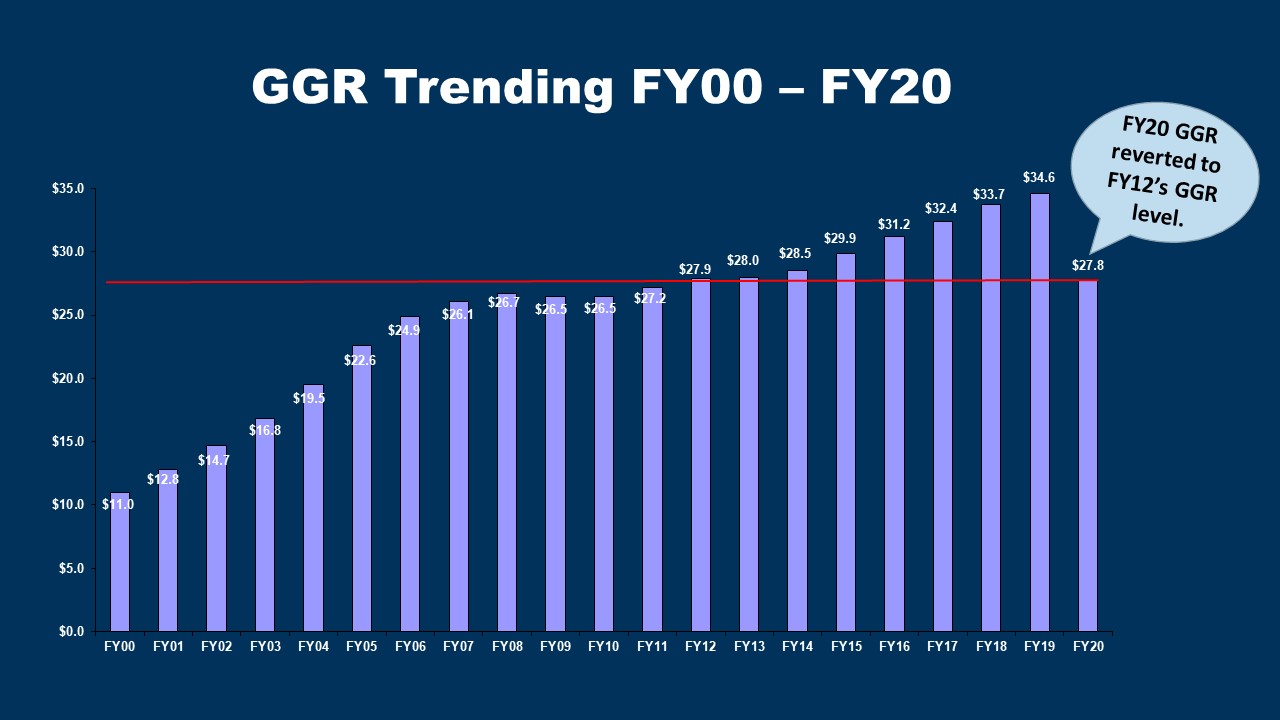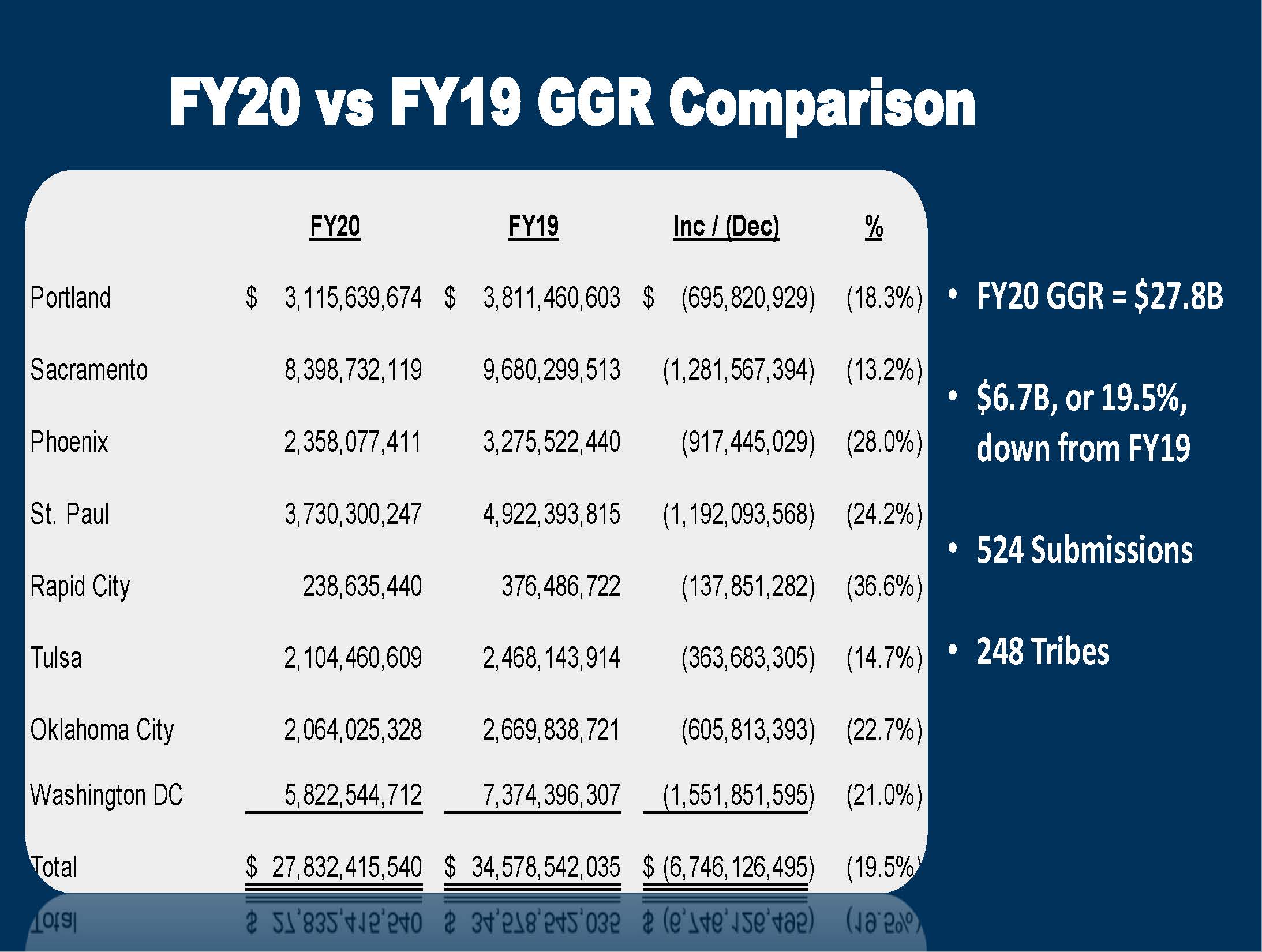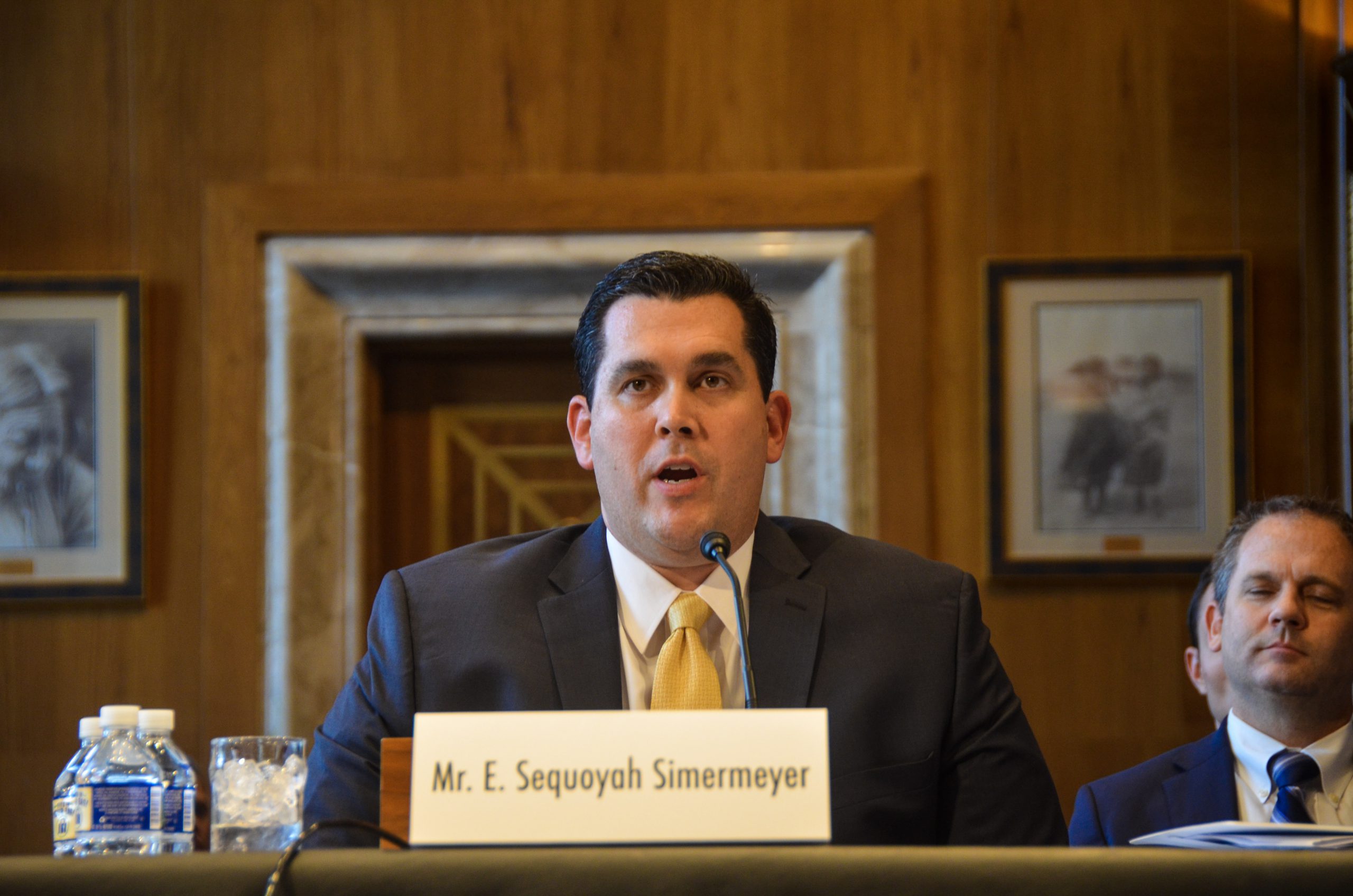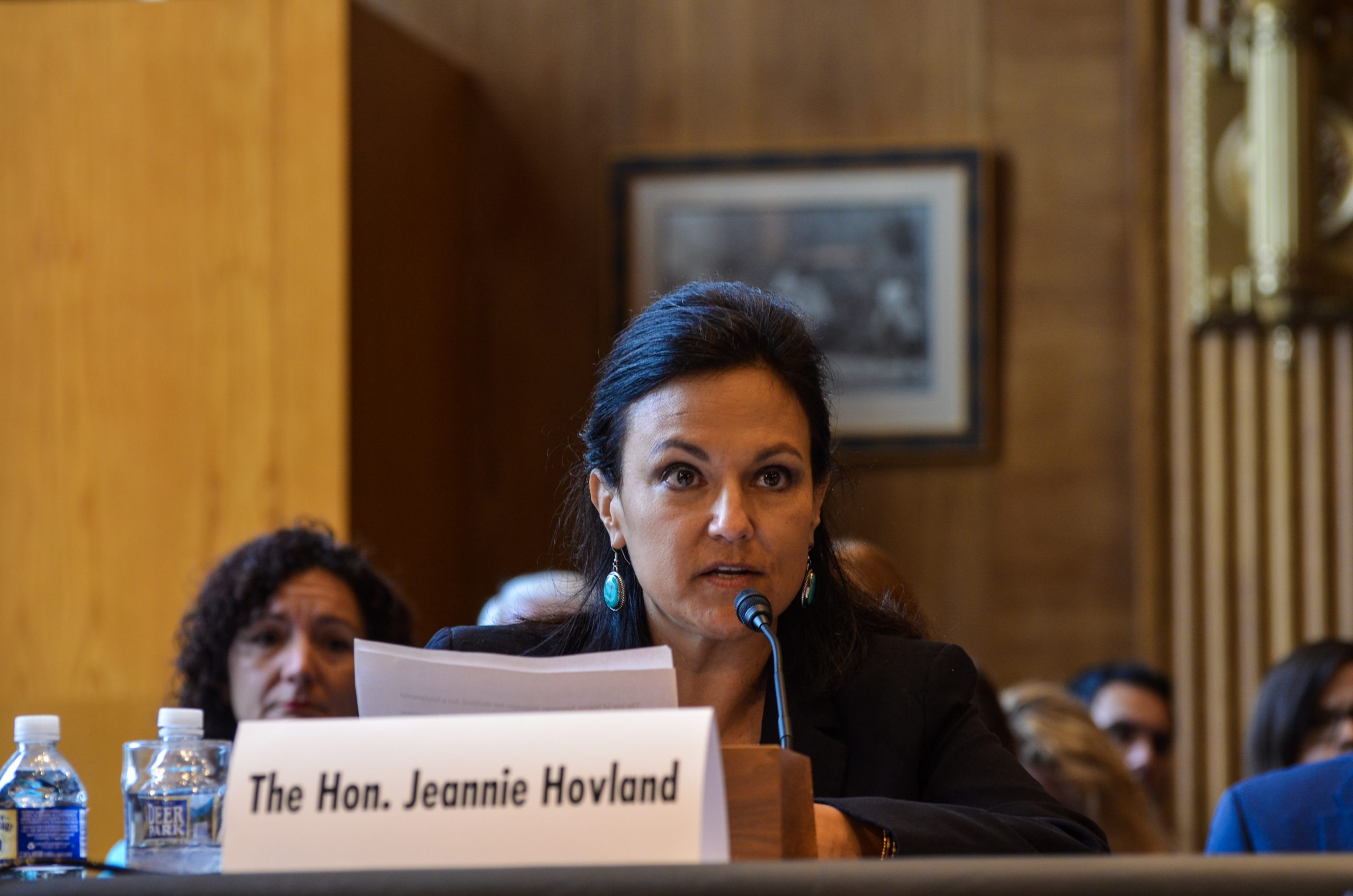Indianz.Com > News > Indian gaming industry sees unprecedented drop in revenues due to COVID-19
Indian gaming industry sees unprecedented drop in revenues due to COVID-19
Tuesday, August 17, 2021
Indianz.Com
Tribal casino revenues took a major hit due to the COVID-19 pandemic, according to figures released by the National Indian Gaming Commission.
Tribal gaming facilities took in $27.8 billion in gross gaming revenues fiscal year 2020, the independent federal agency announced on Tuesday. That represented an unprecedented decline of 19.5 percent, returning the industry to days not seen in almost two decades.
“This fiscal year 2020 report indicates Indian gaming revenues — like other parts of the national economy — have suffered because of the COVID pandemic,” NIGC Chairman E. Sequoyah Simermeyer said in a video announcement.
“The industry has not seen this significant decrease in nearly 20 years,” added Simermeyer, a citizen of the Coharie Tribe who is a Trump-era political appointee to the NIGC.


The spread of the Delta variant, however, has not prompted widespread closures of casinos in Indian Country. The Chickasaw Nation, which operates more gaming facilities than any other tribe in Oklahoma and in the U.S., continues to serve patrons at places like the WinStar World Casino and Resort near the Texas border. “What we’re concerned about is heading into fall,” Dr. John Krueger, who serves as chief medical officer and chief quality officer for the Chickasaw Nation’s health system, told CNTV News, the tribe’s news program. “How you do in summer portends how you are going to do in the fall months. That’s the concern,” Krueger said on the program. “That’s why now is the time to go ahead and get vaccinated, because it’s going to be September pretty soon, and you’ll want to have two doses in.” The Chickasaw Nation has administered over 62,000 doses of the COVID-19 vaccine, according to Krueger. And like many others, the tribe has been working to innoculate all area residents, Indian and non-Indian alike, from the coronavirus as Delta continues to spread among those who have not yet been vaccinated.Indian Health Service #Coronavirus data doesn't look good.
— indianz.com (@indianz) August 17, 2021
TEN @IHSgov areas with high #COVID19 7-day positivity rates:
Oklahoma City—19.2% positive
California—15.5%
Nashville—11.8%
Phoenix—11.7%
Portland—7.9%
Navajo—7.5%
Bemidji—6.9%
Alaska—6.2%
Billings—5.4%
Great Plains—5.0% pic.twitter.com/ijpiYNHNOF


Under IGRA, the appointment would be in the hands of Secretary Deb Haaland, a citizen of the Pueblo of Laguna who is the first Native person to lead the Department of the Interior and the first Native person in a presidential cabinet. According to the law, each member of the NIGC serves a term of three years. Simermeyer’s stint would be up in November 2021. Hovland’s term presumably ends in January 2024.NIGC Vice Chair Isom-Clause Appointed as Deputy Assistant Secretary for Indian Affairshttps://t.co/Dp0KeIYMS3 pic.twitter.com/DpBRxfyXKH
— National Indian Gaming Commission (@NIGCgov) July 12, 2021
The Oklahoma Indian Gaming Association’s trade show and conference, pitched as bringing the tribal casino family “back together” after COVID-19 closures, began on Monday. The meeting concludes on Wednesday.Good Morning! 🌞 OIGA Conference sessions begin at 9:30 am! See you soon! #oiga #tribalgaming pic.twitter.com/CTOO9MDRfl
— OK Indian Gaming (@okindiangaming) August 17, 2021
National Indian Gaming Commission Documents
News Release: 2020 Indian Gaming Revenues of $27.8 Billion Show a 19.5% Decrease [PDF]
Graph: 2020 Gross Gaming Revenue Trends [JPG] [PDF]
Graphic: 2020 Gaming Revenue Distributed by Region [JPG] [PDF]
Chart: 2020 Gaming Revenue Comparison [JPG] [PDF]
Chart: 2020 Gaming Revenues by Range [JPG] [PDF]
FY 2020 Gross Gaming Revenue Frequently Asked Questions [PDF]
FY 2020 Gross Gaming Revenue Infographic [PNG]
Search
Filed Under
Tags
More Headlines
Native America Calling:Drive to dismantle college inclusion adds another barrier for Native students
Native America Calling: Illinois’ first Native reservation
AUDIO: The Alyce Spotted Bear and Walter Soboleff Commission’s Report on Native Children
VIDEO: The Alyce Spotted Bear and Walter Soboleff Commission’s Report on Native Children
Native America Calling: Charting the future of Native jazz
Native America Calling: Miss Indian World Kassie John
AUDIO: American Indian & Alaska Native Public Witness Hearing: Day 1, Afternoon Session
AUDIO: American Indian & Alaska Native Public Witness Hearing: Day 1, Morning Session
Senate Committee on Indian Affairs hosts discussion on Native children
Native America Calling: Is the sky the limit for tribal sovereignty?
Native America Calling: The economic strength — and responsibilities — of tribal wealth
AUDIO: Senate Committee on Indian Affairs Legislative Hearing to receive testimony on S. 465 & S. 2695
VIDEO: Senate Committee on Indian Affairs Legislative Hearing to receive testimony on S. 465 & S. 2695
AUDIO: Senate Committee on Indian Affairs Business Meeting to consider S. 616, S. 2868, S. 3022, H.R. 1240, S. 2796
VIDEO: Senate Committee on Indian Affairs Business Meeting to consider S. 616, S. 2868, S. 3022, H.R. 1240, S. 2796
More Headlines
Native America Calling: Illinois’ first Native reservation
AUDIO: The Alyce Spotted Bear and Walter Soboleff Commission’s Report on Native Children
VIDEO: The Alyce Spotted Bear and Walter Soboleff Commission’s Report on Native Children
Native America Calling: Charting the future of Native jazz
Native America Calling: Miss Indian World Kassie John
AUDIO: American Indian & Alaska Native Public Witness Hearing: Day 1, Afternoon Session
AUDIO: American Indian & Alaska Native Public Witness Hearing: Day 1, Morning Session
Senate Committee on Indian Affairs hosts discussion on Native children
Native America Calling: Is the sky the limit for tribal sovereignty?
Native America Calling: The economic strength — and responsibilities — of tribal wealth
AUDIO: Senate Committee on Indian Affairs Legislative Hearing to receive testimony on S. 465 & S. 2695
VIDEO: Senate Committee on Indian Affairs Legislative Hearing to receive testimony on S. 465 & S. 2695
AUDIO: Senate Committee on Indian Affairs Business Meeting to consider S. 616, S. 2868, S. 3022, H.R. 1240, S. 2796
VIDEO: Senate Committee on Indian Affairs Business Meeting to consider S. 616, S. 2868, S. 3022, H.R. 1240, S. 2796
More Headlines